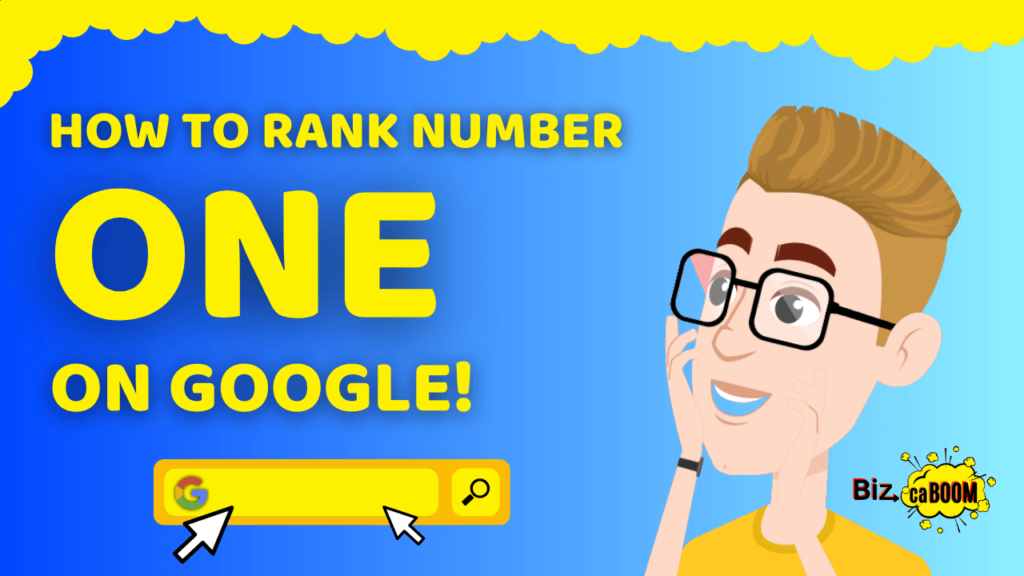
How to Rank Number One on Google
How to Rank NUMBER ONE (#1) on GOOGLE | BizcaBOOM The goal of getting to the top of Google’s number one search results is something

The goal of getting to the top of Google’s number one search results is something that every company and website owner strives for. It’s easy to see why: getting to the top of the search engine results page (or even one of the top three) will boost your site’s traffic, visibility, and revenue potential, propelling your business to the front of the pack.
If you want to get found on the top page of a Google search, you need to have a high search engine ranking. Being ranked on the second or third page of search results is something you must avoid doing at all costs. SEO isn’t worth your time and money if you don’t receive enough traffic and clicks. Moreover, 93% of all online encounters begin with a search engine, so you need that organic traffic. Over one trillion searches take place every month! SEO can have a long-term impact on your organization if you have a strong presence online. A typical website owner can’t get their site on page one of Google for the most sought-after keywords. Many high-profile websites are already taking advantage of the most popular industry keywords.
Thousands of other bloggers are also vying for position one for the same phrase. If that’s the case, the odds are stacked against them. And it’s not in your best interest. However, don’t give up! There are a few tried-and-true strategies that have helped me rank well on Google’s first page. The best part is that many of these keywords don’t require you to have a lot of authority or links to rank for them.
Unfortunately, it’s rare for a person to rise to the Google number one by accident. Even the most experienced and qualified marketers have a hard time rising to the number one on Google. How can a typical business owner hope to achieve this? In this piece, we’ll look at a few tactics that anyone can take to significantly boost their chances of obtaining the top spot in the search results.
The competitive landscape is an important part of SEO success. Because of your limited resources, you should avoid putting yourself in a position to compete with giant corporations with seemingly limitless marketing budgets. The chances of beating them are slim, and you’ll end up wasting both your time and money in the process.
This is why narrowing your focus is so critical. This is what I mean by “dig down and become a ‘large fish in a tiny pond’ instead of trying to compete with major corporations for incredibly popular (and usually more general) phrases.”
Be aware that altering your business’ focus from more general to more focused items or services may be necessary. If you want to specialize on “one day bathroom renos” or “custom kitchen makeovers,” for example, you don’t have to offer all types of home renovation services. As a result, you’ll likely be able to begin ranking much more quickly for these more specialized keyword terms.
Despite the fact that most of these algorithm modifications are not made public, Google execs like Gary Illyes and John Mueller have confirmed that Google continuously tweaks its algorithm. According to Moz, Google’s search algorithm changes 500 to 600 times a year!
The inner workings of Google’s algorithm remain a mystery, despite the fact that the company used to make huge announcements about algorithmic changes. The vast bulk of the material available is merely conjecture from people in the sector.
Google wouldn’t be able to rank only the best results if everyone knew exactly how to get to rank number one of the search results without being penalized for using shortcuts or black hat SEO techniques. Without putting in the time and effort, anyone may make it to the top.
Not to mention Panda, Google EMDs (exact match domain names), and the PBN deindexing updates from the recent Google algorithm changes. Then there’s Phantom, which first emerged in May 2013 and has been rumored to have been updated four times – but Google has yet to confirm this information. You can find a wealth of helpful information online.
Moz’s Google Algorithm Change History database is a wonderful resource for tracking algorithm changes over time. You may also want to check out Google Webmaster Central. To discover more about my link-building, on-page SEO, and user analytics for ranking number one on Google, watch the video below.
It is possible for anyone to rank number one in Google search results if they use the proper keyword targeting strategy. A few days after optimizing for “blue wubbie nubbie doll,” I’d be at the top of the search results. It’s possible to rank for this phrase, but is it worth it? Probably not, given that it isn’t even a product at all.
To put it another way, it’s simple to rank for esoteric keywords. It’s obvious that we want to rank for terms that people actually search for, not obscure ones. What someone actually typed in their browser?
Look for relevant keywords with a reasonable number of searches, but low competition, using tools like Google’s Keyword Planner or KeywordTool.io. The more authority your website gains, the more competitive keywords you may rank for, and the more traffic you get, the better. Each piece of content should be geared toward your target audience.
It’s time to start using the keywords you’ve chosen in strategic places on your page once you’ve “gone niche.” While it’s crucial to avoid keyword stuffing, it’s also helpful to employ them in a variety of contexts throughout your content. Most importantly, focus on using them in you’re:
Be mindful of the fact that Google (and your readers) prefer detailed content that thoroughly covers the subject at hand. It is crucial to include your keywords in your content, but it is not a substitute for writing lengthier, more in-depth content that truly represents the subject matter of your post.
88% of B2B organizations now employ content marketing as part of their overall marketing plan according to the Content Marketing Institute. For example, you can use blog articles and newsletters in addition to videos and other forms of content to attract new clients.
If you want to rank number one in Google, you must constantly update your website with new information. Instead of adding content for the sake of adding material, focus on providing relevant, high-quality content to your consumers and prospects.
You may use this content to improve your search engine rankings in two ways. As a first step, having a lot of content implies that Google has a lot more opportunity to return your site in its search results. As a second benefit of having a large body of work, the more links you’ll naturally gather. Having a lot of material is also a terrific way to keep visitors on your site for a longer period of time.
Links continue to play a critical role in terms of SEO. In fact, according to Moz’s 2015 Search Engine Ranking Factors report, inbound links are the single most important element for achieving high rankings.
Some strategies you can use to acquire links to your site include:
For more link building tips, check out my posts, 7 Killer Link Building Strategies For Small Businesses and 6 Easy Link Building Strategies For Your New Website.
If you want to rank well for a specific term, you must have relevant and authoritative links leading to your page. Google does not rank websites; rather, Google ranks individual web pages. Link to this page: https://www.goo.gl/Os88E Websites are not ranked by Google; rather, Google ranks individual pages. In other words.
Neither the Directive website nor the pages we’re seeking to rank for our target term are ranked by Google. You need to build links to the pages you want to rank, not just allow them flow naturally to the root domain. That’s a good start, but it’s not the most effective. You’ll lose out on potential customers if your product isn’t the most useful.
To locate industry-specific trade periodicals — or, if you’re in the service industry, industry-specific software — If you’re in the software field, look into similar services and start sending out guest post emails. Pitchbox is a tool we use to promote our organization. We look at the most important conferences in our industry to discover the best compatible software. Find the conference exhibitor listings and search for each company’s name in the exhibitor database a virtual assistant is used to obtain the email addresses of content marketing managers and conference sponsors.
The other sponsors share our audience if we sponsor a conference because ours will be in attendance. As a result, these other companies are not only relevant and authoritative, but they are also able to reach the people we’re attempting to reach out to.
Guest blogging is a great way to help each other out. An authoritative piece of material from a more authoritative source is the best link in the world. In the event that our outreach activities elicit interest, we develop relevant content for their blogs. This helps us create trust with our customers and also increases the amount of material they produce on their own site.
Our brand’s authority rises when we write for a well-known company whose website is regarded as trustworthy and authoritative. When you guest post on other people’s websites, you can get links from those sites that are both authoritative and relevant, which improves the number of people who see your website. Brand recognition, SERP position, and discoverability all improve as a result.
Also, be careful with the anchor text you employ. Link to your SEO agency page with the terms “SEO agency” in the link if you’re seeking to rank for “SEO agency.” Don’t overdo it, but if you use this method infrequently and relevantly, you’ll be able to rank higher for the term you’re aiming for.
Having a social media presence is a need for any modern business. The fact that links to your site on your social media can improve your SEO ranking is well-known by now, but did you know it? Make sure your content is “social-friendly” because a lot of traffic comes from social networks like Facebook and Instagram. The titles and captions of your posts should be interesting, and the photographs should correctly represent your business.
The more your followers enjoy, comment on, and share your work, the more likely they are to do so. Try re-sharing a page that has fallen in the search ranks. In many cases, this will help it rise in the rankings more quickly. Increasing your website’s visibility in search results is no longer the exclusive goal of SEO.
Developing a strong brand is essential if you want your firm to grow and become more reputable. On Google, it’s considered a sign of quality when a lot of people are searching for your company name. If you want to get more traffic to your site, I recommend launching sponsored search campaigns, advertising on YouTube and Facebook, and participating in guest blogging.
To rank well, you need more than just great content. Packaging and distribution are equally critical. You can’t hope to reach your intended audience if you don’t know who they are.
You may tailor your content to your target audience’s interests and problems once you’ve defined your customer persona (or personas). For this reason, it’s important to optimize your website for search engines so that it appears higher in the results pages (SERPs). It’s possible to use this information to collect email addresses and remarket to subscribers, as well.
There’s an approach that’s typically neglected when it comes to Google’s first page rankings. It’s possible to refresh your existing content rather of constantly creating new material. As well as saving time and effort, this method also yields quicker results.
As a general rule, if you tell Google that your material is new, you will see an increase in traffic. You should update the most important pages that generate conversions on a monthly basis. Update secondary content on a quarterly basis. And update any residual content on an annual basis. This is a solid rule of thumb to follow. You should use long form text as well as images and video. There’s a lot of evidence that long-form content is better for SEO in the year 2021, according to data.
Backlinks are more likely to come from long-form content, which has a larger probability of gaining high-quality links. Remember that visual material performs better than plain text content, so don’t forget to include images and movies in your 2,000+ words.
When it comes to online marketing, click-through rate is an important indicator that can be used to gauge a campaign’s success. It’s computed by dividing the number of people who saw your page by the number of people who clicked on it. Your website’s click-through rates from search results can be tracked using the Google Search Console.
A high click-through rate on one of your pages indicates that you’re providing visitors with what they’re looking for and that no additional action is required of you. If your page’s click-through rate is low, it’s time to investigate what might be causing the problem and adjust your strategy.
SEO strategies like BERT and EAT are essential if you want to get to number one on Google’s search results. Search engine BERT, which stands for “Bidirectional Encoder Representations from Transformers,” is Google’s latest technology, aimed to help bots understand human language and decipher the user’s intentions. There are three fundamental elements that Google employs to determine a website’s credibility: EAT, which stands for trustworthiness, expertise, and authority. If your firm adheres to the EAT structure, you’ll be able to compete in highly competitive domains, such as law and medicine.
Search engine optimization (SEO) isn’t a complicated process when you follow this guide on how to rank number one on Google step-by-step without skipping through.
However, certain keywords are more difficult than others to rank for. As a result, it’s a good idea to pursue rankings for less competitive keywords that you already rank for. You then have to figure out why you’re being ranked lower than your rivals and do everything you can to change it.
Want to Seriously Increase Your Traffic and Rankings on Google?

If you ever need a helping hand in getting your Houston company at the top of Google, look no further and book a call with BizcaBOOM, an SEO Company in Houston, so that you can get more calls coming in. Or if you’re in need of a professional web designer in The Woodlands, feel free to contact us here.
Now that you have learned how to rank your Houston business higher on Google Maps, why not share this post with your friends?
Spread the word out so we can continue to give you valuable SEO content!
Recent Articles:

How to Rank NUMBER ONE (#1) on GOOGLE | BizcaBOOM The goal of getting to the top of Google’s number one search results is something

How to Choose the Right Keywords for SEO Purposes | BizcaBOOM One of the most critical aspects of good search engine optimization is choosing the

Is SEO Better than Google Ads? SEO vs Google Ads Many businesses use marketing techniques such as search engine optimization (SEO) and Google Ads to

How to Rank NUMBER ONE (#1) on GOOGLE | BizcaBOOM The goal of getting to the top of Google’s number one search results is something

How to Choose the Right Keywords for SEO Purposes | BizcaBOOM One of the most critical aspects of good search engine optimization is choosing the

Is SEO Better than Google Ads? SEO vs Google Ads Many businesses use marketing techniques such as search engine optimization (SEO) and Google Ads to
Tell us about your company: